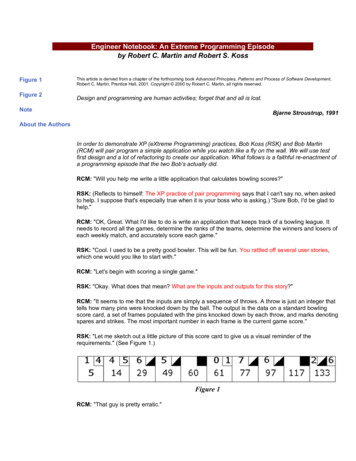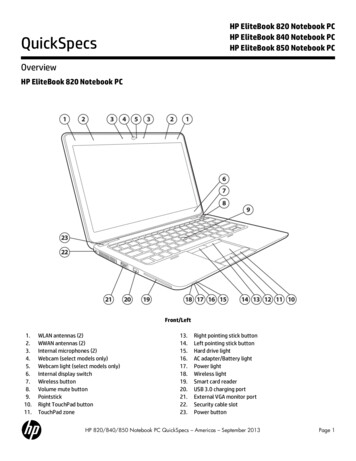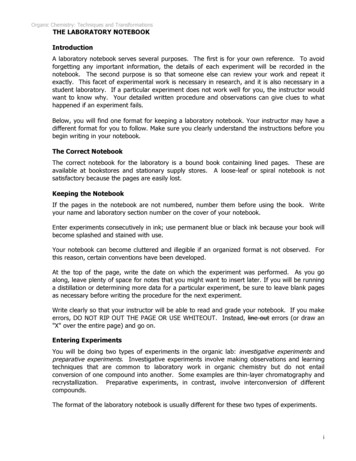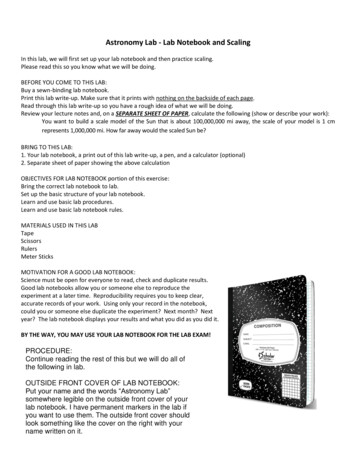
Transcription
Engineer Notebook: An Extreme Programming Episodeby Robert C. Martin and Robert S. KossFigure 1Figure 2This article is derived from a chapter of the forthcoming book Advanced Principles, Patterns and Process of Software Development,Robert C. Martin, Prentice Hall, 2001. Copyright 2000 by Robert C. Martin, all rights reserved.Design and programming are human activities; forget that and all is lost.NoteBjarne Stroustrup, 1991About the AuthorsIn order to demonstrate XP (eXtreme Programming) practices, Bob Koss (RSK) and Bob Martin(RCM) will pair program a simple application while you watch like a fly on the wall. We will use testfirst design and a lot of refactoring to create our application. What follows is a faithful re-enactment ofa programming episode that the two Bob's actually did.RCM: "Will you help me write a little application that calculates bowling scores?"RSK: (Reflects to himself: The XP practice of pair programming says that I can't say no, when askedto help. I suppose that's especially true when it is your boss who is asking.) "Sure Bob, I'd be glad tohelp."RCM: "OK, Great. What I'd like to do is write an application that keeps track of a bowling league. Itneeds to record all the games, determine the ranks of the teams, determine the winners and losers ofeach weekly match, and accurately score each game."RSK: "Cool. I used to be a pretty good bowler. This will be fun. You rattled off several user stories,which one would you like to start with."RCM: "Let's begin with scoring a single game."RSK: "Okay. What does that mean? What are the inputs and outputs for this story?"RCM: "It seems to me that the inputs are simply a sequence of throws. A throw is just an integer thattells how many pins were knocked down by the ball. The output is the data on a standard bowlingscore card, a set of frames populated with the pins knocked down by each throw, and marks denotingspares and strikes. The most important number in each frame is the current game score."RSK: "Let me sketch out a little picture of this score card to give us a visual reminder of therequirements." (See Figure 1.)Figure 1RCM: "That guy is pretty erratic."
RSK: "Or drunk, but it will serve as a decent acceptance test."RCM: "We'll need others, but let's deal with that later. How should we start? Shall we come up with adesign for the system?"RSK: "Well, don't hate me, but I wouldn't mind a UML diagram showing the problem domain conceptsthat we might see from the score card. That will give us some candidate objects that we can explorefurther in code."RCM: (Putting on his powerful object designer hat) "OK, clearly a game object consists of a sequenceof ten frames. Each frame object contains one, two, or three throws."RSK: "Great minds. That was exactly what I was thinking. Let me quickly draw that, but if you tellKent, I'll deny it." (See Figure 2.)Figure 2Kent: "I'm always watching."RSK: "Well, pick a class . any class. Shall we start at the end of the dependency chain and workbackwards? That will make testing easier."RCM: "Sure, why not. Let's create a test case for the Throw class."RSK: (Starts -----import junit.framework.*;public class TestThrow extends TestCase{public TestThrow(String name){super(name);}// public void test?}RSK: "Do you have a clue what the behavior of a Throw object should be?"RCM: "It holds the number of pins knocked down by the player."RSK: "Okay, you just said in not so many words that it doesn't really do anything. Maybe we shouldcome back to it and focus on an object that actually has behavior, instead of one that's just a datastore."RCM: "Hmm. You mean the Throw class might not really exist?"
RSK: (Starts to sweat. This is my boss I'm working with.) "Well, if it doesn't have any behavior, howimportant can it be? I don't know if it exists or not yet. I'd just feel more productive if we were workingon an object that had more than setters and getters for methods. But if you want to drive." (slides thekeyboard to RCM).RCM: "Well, let's move up the dependency chain to Frame and see if there are any test cases wecan write that will force us to finish Throw." (Pushes the keyboard back to RSK.)RSK: (Wondering if RCM is leading me down a blind alley to educate me or if he is really agreeingwith me) "Okay, new file, new test -------import junit.framework.*;public class TestFrame extends TestCase{public TestFrame( String name ){super( name );}}//public void test?RCM: "OK, that's the second time we've typed that. Now, can you think of any interesting test casesfor Frame?"RSK: "A frame might provide its score, the number of pins on each throw, whether there was a strikeor a spare."RCM: "Too much talk, not enough code. Type!"RSK: -----import junit.framework.*;public class TestFrame extends TestCase{public TestFrame( String name ){super( name );}public void testScoreNoThrows(){Frame f new Frame();assertEquals( 0, f.getScore() ----public class Frame{
}public int getScore(){return 0;}RCM: "OK, the test case passes. But Score is a really stupid function. It will fail if we add a throw tothe frame. So let's write the test case that adds some throws and then checks the -----public void testAddOneThrow(){Frame f new Frame();f.add(5);assertEquals(5, f.getScore());}RCM: "That doesn't compile. There's no add method in Frame."RSK: "I'll bet if you define the method it will -------------public class Frame{public int getScore(){return 0;}public void add(Throw t){}}RCM: (Thinking out loud) "This doesn't compile because we haven't written the Throw class."RSK: "Talk to me, Bob. The test is passing an integer, and the method expects a Throw object. Youcan't have it both ways. Before we go down the Throw path again, can you describe its behavior?"RCM: "Wow! I didn't even notice that I had written f.add(5). I should have written f.add(newThrow(5)), but that's ugly as hell. What I really want to write is f.add(5)."RSK: "Ugly or not, let's leave aesthetics out of it for the time being. Can you describe any behavior ofa Throw object — binary response, Bob?"RCM: "101101011010100101. I don't know if there is any behavior in Throw; I'm beginning to think aThrow is just an int. However, we don't need to consider that yet, since we can write Frame.add totake an int."RSK: "Then I think we should do that for no other reason than it's simple. When we feel pain, we can
do something more sophisticated."RCM: ---------public class Frame{public int getScore(){return 0;}}public void add(int pins){}RCM: "OK, this compiles and fails the test. Now, let's make the test ------public class Frame{public int getScore(){return itsScore;}public void add(int pins){itsScore pins;}private int itsScore 0;}RCM: "This compiles and passes the tests. But it's clearly simplistic. What's the next test case?"RSK: "Can we take a break first?"RCM: "That's better. Frame.add is a fragile function. What if you call it with an 11?"RSK: "It can throw an exception if that happens. But who is calling it? Is this going to be anapplication framework that thousands of people will use and we have to protect against such things,or is this going to be used by you and only you? If the latter, just don't call it with an 11" (chuckle).RCM: "Good point, the tests in the rest of the system will catch an invalid argument. If we run intotrouble, we can put the check in later. So, the add function doesn't currently handle strikes or spares.Let's write a test case that expresses that."RSK: "Hmmmm. if we call add(10) to represent a strike, what should getScore return? I don't knowhow to write the assertion, so maybe we're asking the wrong question. Or we're asking the rightquestion to the wrong object."
RCM: "When you call add(10), or add(3) followed by add(7), then calling getScore on the Frame ismeaningless. The frame would have to look ahead at later frames to calculate its score. If those laterframes don't exist, then it would have to return something ugly like -1. I don't want to return -1."RSK: "Yeah, I hate the -1 idea too. You've introduced the idea of frames knowing about other frames.Who is holding these different frame objects?"RCM: "The Game object."RSK: "So Game depends on Frame, and Frame in turn depends on Game. I hate that."RCM: "Frames don't have to depend upon Game; they could be arranged in a linked list. Each framecould hold pointers to its next and previous frames. To get the score from a frame, the framewould look backwards to get the score of the previous frame and look forwards for any spare or strikeballs it needs."RSK: "Okay, I'm feeling kind of dumb because I can't visualize this. Show me some code, boss."RCM: "Right. So, we need a test case first."RSK: "For Game or another test for Frame?"RCM: "I think we need one for Game, since it's Game that will build the frames and hook them up toeach other."RSK: "Do you want to stop what we're doing on Frame and do a mental long jump to Game, or doyou just want to have a MockGame object that does just what we need to get Frame working?"RCM: "No, let's stop working on Frame and start working on Game. The test cases in Game shouldprove that we need the linked list of Frames."RSK: "I'm not sure how they'll show the need for the list. I need ----------------import junit.framework.*;public class TestGame extends TestCase{public TestGame(String name){super(name);}}public void testOneThrow(){Game g new Game();g.add(5);assertEquals(5, g.score());}
RCM: "Does that look reasonable?"RSK: "Sure, but I'm still looking for proof for this list of Frames."RCM: "Me too. Let's keep following these test cases and see where they public class Game{public int score(){return 0;}}public void add(int pins){}RCM: "OK, this compiles and fails the test. Now let's make it public class Game{public int score(){return itsScore;}public void add(int pins){itsScore pins;}private int itsScore 0;}RCM: "This passes. Good."RSK: "I can't disagree with it. But I'm still looking for this great proof of the need for a linked list offrame objects. That's what led us to Game in the first place."RCM: "Yeah, that's what I'm looking for too. I fully expect that once we start injecting spare and striketest cases, we'll have to build frames and tie them together in a linked list. But I don't want to buildthat until the code forces us to."RSK: "Good point. Let's keep going in small steps on Game. What about another test that tests twothrows but with no spare?"RCM: "OK, that should pass right now. Let's try ----------public void testTwoThrowsNoMark()
{}Game g new Game();g.add(5);g.add(4);assertEquals(9, g.score());RCM: "Yep, that one passes. Now let's try four balls, with no marks."RSK: "Well, that will pass too. I didn't expect this. We can keep adding throws, and we don't evereven need a Frame. But we haven't done a spare or a strike yet. Maybe that's when we'll have tomake one."RCM: "That's what I'm counting on. However, consider this test ------------public void testFourThrowsNoMark(){Game g new quals(18, g.score());assertEquals(9, g.scoreForFrame(1));assertEquals(18, g.scoreForFrame(2));}RCM: "Does this look reasonable?"RSK: "It sure does. I forgot that we have to be able to show the score in each frame. Ah, our sketchof the score card was serving as a coaster for my Diet Coke. Yeah, that's why I forgot."RCM: (Sigh) "OK, first let's make this test case fail by adding the scoreForFrame method to public int scoreForFrame(int frame){return 0;}RCM: "Great, this compiles and fails. Now, how do we make it pass?"RSK: "We can start making frame objects. But is that the simplest thing that will get the test to pass?"RCM: "No, actually, we could just create an array of integers in Game. Each call to add wouldappend a new integer onto the array. Each call to scoreForFrame will just work forward through thearray and calculate the -public class Game{
public int score(){return itsScore;}public void add(int pins){itsThrows[itsCurrentThrow ] pins;itsScore pins;}public int scoreForFrame(int frame){int score 0;for ( int ball 0;frame 0 && (ball itsCurrentThrow);ball 2, frame--){score itsThrows[ball] itsThrows[ball 1];}return score;}private int itsScore 0;private int[] itsThrows new int[21];private int itsCurrentThrow 0;}RCM: (Very satisfied with himself) "There, that works."RSK: "Why the magic number 21?"RCM: "That's the maximum possible number of throws in a game."RSK: "Yuck. Let me guess, in your youth you were a Unix hacker and prided yourself on writing anentire application in one statement that nobody else could decipher."scoreForFrame needs to be refactored to be more communicative. But before we considerrefactoring, let me ask another question: Is Game the best place for this method? In my mind, Gameis violating Bertrand Meyer's SRP (Single Responsibility Principle) [1]. It is accepting throws and itknows how to score for each frame. What would you think about a Scorer object?"RCM: (Makes a rude oscillating gesture with his hand) "I don't know where the functions live now;right now I'm interested in getting the scoring stuff to work. Once we've got that all in place, then wecan debate the values of the SRP."However, I see your point about the Unix hacker stuff; let's try to simplify that loop."public int scoreForFrame(int theFrame){int ball 0;int score 0;for (int currentFrame 0;currentFrame theFrame;currentFrame )
{score itsThrows[ball ] itsThrows[ball ];}}return score;RCM: "That's a little better, but there are side-effects in the score expression. They don't matterhere because it doesn't matter which order the two addend expressions are evaluated in." (Or doesit? It's possible that the two increments could be done before either array operations.)RSK: "I suppose we could do an experiment to verify that there aren't any side-effects, but thatfunction isn't going to work with spares and strikes. Should we keep trying to make it more readableor should we push further on its functionality?"RCM: "The experiment would only have meaning on certain compilers. Other compilers might usedifferent evaluation orders. Let's get rid of the order dependency and then push on with more testcases."public int scoreForFrame(int theFrame){int ball 0;int score 0;for (int currentFrame 0;currentFrame theFrame;currentFrame ){int firstThrow itsThrows[ball ];int secondThrow itsThrows[ball ];score firstThrow secondThrow;}}return score;RCM: "OK, next test case. Let's try a spare."public void testSimpleSpare(){Game g new Game();}RCM: "I'm tired of writing this. Let's refactor the test and put the creation of the game in a ---------------------import junit.framework.*;public class TestGame extends TestCase{public TestGame(String name){super(name);}
private Game g;public void setUp(){g new Game();}public void testOneThrow(){g.add(5);assertEquals(5, g.score());}public void ls(9, g.score());}public void g.add(2);assertEquals(18, g.score());assertEquals(9, g.scoreForFrame(1));assertEquals(18, g.scoreForFrame(2));}}public void testSimpleSpare(){}RCM: "That's better, now let's write the spare test case."RSK: "I'll drive."public int scoreForFrame(int theFrame){int ball 0;int score 0;for (int currentFrame 0;currentFrame theFrame;currentFrame ){int firstThrow itsThrows[ball ];int secondThrow itsThrows[ball ];int frameScore firstThrow secondThrow;// spare needs next frames first throwif ( frameScore 10 )score frameScore itsThrows[ball ];else
score frameScore;}}return score;RCM: (Grabbing the keyboard) "OK, but I think the increment of ball in the frameScore 10 caseshouldn't be there. Here's a test case that proves my point."public void d(3);g.add(2);assertEquals(13, g.scoreForFrame(1));assertEquals(18, g.score());}RCM: "Ha! See, that fails. Now if we just take out that pesky extra increment."if ( frameScore 10 )score frameScore itsThrows[ball];RCM: "Uh, it still fails. Could it be that the score method is wrong? I'll test that by changing the testcase to use scoreForFrame(2)."public void d(3);g.add(2);assertEquals(13, g.scoreForFrame(1));assertEquals(18, g.scoreForFrame(2));}RCM: "Hmmmm. That passes. The score method must be messed up. Let's look at it."public int score(){return itsScore;}public void add(int pins){itsThrows[itsCurrentThrow ] pins;itsScore pins;}RCM: "Yeah, that's wrong. The score method is just returning the sum of the pins, not the properscore. What we need score to do is call scoreForFrame with the current frame."
RSK: "We don't know what the current frame is. Let's add that message to each of our current tests,one at a time, of course."RCM: --------------public void testOneThrow(){g.add(5);assertEquals(5, g.score());assertEquals(1, ----------------public int getCurrentFrame(){return 1;}RCM: "OK, that works. But it's stupid. Let's do the next test case."public void ls(9, g.score());assertEquals(1, g.getCurrentFrame());}RCM: "That one's uninteresting; let's try the next."public void g.add(2);assertEquals(18, g.score());assertEquals(9, g.scoreForFrame(1));assertEquals(18, g.scoreForFrame(2));assertEquals(2, g.getCurrentFrame());}RCM: "This one fails. Now let's make it pass."RSK: "I think the algorithm is trivial. Just divide the number of throws by two, since there are twothrows per frame. Unless we have a strike . but we don't have strikes yet, so let's ignore them heretoo."RCM: (Flails around adding and subtracting one until it works)public int getCurrentFrame(){
return 1 (itsCurrentThrow-1)/2;}RCM: "That isn't very satisfying."RSK: "What if we don't calculate it each time? What if we adjust a currentFrame member variableafter each throw?"RCM: "OK, let's try public int getCurrentFrame(){return itsCurrentFrame;}public void add(int pins){itsThrows[itsCurrentThrow ] pins;itsScore pins;if (firstThrow true){firstThrow false;itsCurrentFrame ;}else{firstThrow true;;}}private int itsCurrentFrame 0;private boolean firstThrow true;}RCM: "OK, this works. But it also implies that the current frame is the frame of the last ball thrown,not the frame that the next ball will be thrown into. As long as we remember that, we'll be fine."RSK: "I don't have that good of a memory, so let's make it more readable. But before we go screwingaround with it some more, let's pull that code out of add and put it in a private member function calledadjustCurrentFrame or something."RCM: "OK, that sounds good"public void add(int pins){itsThrows[itsCurrentThrow ] pins;itsScore pins;adjustCurrentFrame();}private void adjustCurrentFrame(){if (firstThrow true){
firstThrow false;itsCurrentFrame ;}}else{firstThrow true;;}RCM: "Now let's change the variable and function names to be more clear. What should we callitsCurrentFrame?"RSK: "I kind of like that name. I don't think we're incrementing it in the right place though. The currentframe, to me, is the frame number that I'm throwing in. So it should get incremented right after the lastthrow in a frame."RCM: "I agree. Let's change the test cases to reflect that; then we'll fix --------------------------public void ls(9, g.score());assertEquals(2, g.getCurrentFrame());}public void g.add(2);assertEquals(18, g.score());assertEquals(9, g.scoreForFrame(1));assertEquals(18, g.scoreForFrame(2));assertEquals(3, ----------------------------private void adjustCurrentFrame(){if (firstThrow true){firstThrow false;}else{firstThrow true;itsCurrentFrame ;}}private int itsCurrentFrame 1;}
RCM: "OK, that's working. Now let's test getCurrentFrame in the two spare cases."public void tEquals(13, g.scoreForFrame(1));assertEquals(2, g.getCurrentFrame());}public void d(3);g.add(2);assertEquals(13, g.scoreForFrame(1));assertEquals(18, g.scoreForFrame(2));assertEquals(3, g.getCurrentFrame());}RCM: "This works. Now, back to the original problem. We need score to work. We can now writescore to call scoreForFrame(getCurrentFrame()-1).public void d(3);g.add(2);assertEquals(13, g.scoreForFrame(1));assertEquals(18, g.scoreForFrame(2));assertEquals(18, g.score());assertEquals(3, ----------------public int score(){return scoreForFrame(getCurrentFrame()-1);}RCM: "This fails the TestOneThrow test case. Let's look at it."public void testOneThrow(){g.add(5);assertEquals(5, g.score());assertEquals(1, g.getCurrentFrame());}
RCM: "With only one throw, the first frame is incomplete. The score method is callingscoreForFrame(0). This is yucky."RSK: "Maybe, maybe not. Who are we writing this program for, and who is going to be calling score?Is it reasonable to assume that it won't get called on an incomplete frame?"RCM: "Yeah. But it bothers me. To get around this, we have take the score out of the testOneThrowtest case. Is that what we want to do?"RSK: "We could. We could even eliminate the entire testOneThrow test case. It was used to rampus up to the test cases of interest. Does it really serve a useful purpose now? We still have coveragein all of the other test cases."RCM: "Yeah, I see your point. OK, out it goes." (Edits code, runs test, and gets green bar.) "Ahhh,that's better."Now, we'd better work on the strike test case. After all, we want to see all those Frame objects builtinto a linked list, don't we?" (snicker).public void ertEquals(19, g.scoreForFrame(1));assertEquals(28, g.score());assertEquals(3, g.getCurrentFrame());}RCM: "OK, this compiles and fails as predicted. Now we need to make it public class Game{public void add(int pins){itsThrows[itsCurrentThrow ] pins;itsScore pins;adjustCurrentFrame(pins);}private void adjustCurrentFrame(int pins){if (firstThrow true){if( pins 10 ) // strikeitsCurrentFrame ;elsefirstThrow false;}else{
}}firstThrow true;itsCurrentFrame ;public int scoreForFrame(int theFrame){int ball 0;int score 0;for (int currentFrame 0;currentFrame theFrame;currentFrame ){int firstThrow itsThrows[ball ];if (firstThrow 10){score 10 itsThrows[ball] itsThrows[ball 1];}else{int secondThrow itsThrows[ball ];}int frameScore firstThrow secondThrow;// spare needs next frames first throwif ( frameScore 10 )score frameScore itsThrows[ball];elsescore frameScore;}}return score;}private int itsScore 0;private int[] itsThrows new int[21];private int itsCurrentThrow 0;private int itsCurrentFrame 1;private boolean firstThrow true;RCM: "OK, that wasn't too hard. Let's see if it can score a perfect game."public void testPerfectGame(){for (int i 0; i 12; i ){g.add(10);}assertEquals(300, g.score());assertEquals(10, g.getCurrentFrame());}RCM: "Urg, it's saying the score is 330. Why would that be?"
RSK: "Because the current frame is getting incremented all the way to 12."RCM: "Oh! We need to limit it to 10."private void adjustCurrentFrame(int pins){if (firstThrow true){if( pins 10 ) // strikeitsCurrentFrame ;elsefirstThrow false;}else{firstThrow true;itsCurrentFrame ;}itsCurrentFrame Math.min(10, itsCurrentFrame);}RCM: "Damn, now it's saying that the score is 270. What's going on?"RSK: "Bob, the score function is subtracting one from getCurrentFrame, so it's giving you the scorefor frame 9, not 10."RCM: What? You mean I should limit the current frame to 11 not 10? I'll try it.itsCurrentFrame Math.min(11, itsCurrentFrame);RCM: "OK, so now it gets the score correct, but fails because the current frame is 11 and not 10. Ick!this current frame thing is a pain in the butt. We want the current frame to be the frame the player isthrowing into, but what does that mean at the end of the game?"RSK: "Maybe we should go back to the idea that the current frame is the frame of the last ballthrown."RCM: "Or maybe we need to come up with the concept of the last completed frame? After all, thescore of the game at any point in time is the score in the last completed frame."RSK: "A completed frame is a frame that you can write the score into, right?"RCM: "Yes, a frame with a spare in it completes after the next ball. A frame with a strike in itcompletes after the next two balls. A frame with no mark completes after the second ball in the frame."Wait a minute. We are trying to get the score method to work, right? All we need to do is forcescore to call scoreForFrame(10) if the game is complete."RSK: "How do we know if the game is complete?"RCM: "If adjustCurrentFrame ever tries to increment itsCurrentFrame past the 10th frame, then thegame is complete."
RSK: "Wait. All you are saying is that if getCurrentFrame returns 11, the game is complete; that'sthe way the code works now!"RCM: "Hmm. You mean we should change the test case to match the code?"public void testPerfectGame(){for (int i 0; i 12; i ){g.add(10);}assertEquals(300, g.score());assertEquals(11, g.getCurrentFrame());}RCM: "Well, that works. I suppose it's no worse than getMonth returning zero for January, but I stillfeel uneasy about it."RSK: "Maybe something will occurr to us later. Right now, I think I see a bug. May I?" (Grabskeyboard.)public void testEndOfArray(){for (int i 0; i 9; i ){g.add(0);g.add(0);}g.add(2);g.add(8); // 10th frame spareg.add(10); // Strike in last position of array.assertEquals(20, g.score());}RSK: "Hmm. That doesn't fail. I thought since the 21st position of the array was a strike, the scorerwould try to add the 22nd and 23rd positions to the score. But I guess not."RCM: "Hmm, you are still thinking about that scorer object, aren't you? Anyway, I see what you weregetting at, but since score never calls scoreForFrame with a number larger than 10, the last strike isnot actually counted as a strike. It's just counted at a 10 to complete the last spare. We never walkbeyond the end of the array."RSK: "OK, let's pump our original score card into the program."public void 5);g.add(6);g.add(4);
);g.add(8);g.add(6);assertEquals(133, g.score());RSK: "Well, that works. Are there any other test cases that you can think of?"RCM: "Yeah, let's test a few more boundary conditions. How about the poor schmuck who throws 11strikes and then a final 9."public void testHeartBreak(){for (int i 0; i 11; i )g.add(10);g.add(9);assertEquals(299, g.score());}RCM: "That works. OK, how about a 10th frame spare?"}public void testTenthFrameSpare(){for (int i 0; i 9; i (270, g.score());}RCM: (Staring happily at the green bar) "That works too. I can't think of any more, can you."RSK: "No, I think we've covered them all. Besides I really want to refactor this mess. I still see thescorer object in there somewhere."RCM: "OK, well, the scoreForFrame function is pretty messy. Let's consider it."public int scoreForFrame(int theFrame){int ball 0;
int score 0;for (int currentFrame 0;currentFrame theFrame;currentFrame ){int firstThrow itsThrows[ball ];if (firstThrow 10){score 10 itsThrows[ball] itsThrows[ball 1];}else{int secondThrow itsThrows[ball ];}int frameScore firstThrow secondThrow;// spare needs next frames first throwif ( frameScore 10 )score frameScore itsThrows[ball];elsescore frameScore;}}return score;RCM: "I'd really like to extract the body of that else clause into a seperate function namedhandleSecondThrow, but I can't because it uses ball, firstThrow, and secondThrow localvariables."RSK: "We could turn those locals into member variables."RCM: "Yeah, that kind of reinforces your notion that we'll be able to pull the scoring out into its ownscorer object. OK, let's give that a try."RSK: (Grabs keyboard.)private void adjustCurrentFrame(int pins){if (firstThrowInFrame true){if( pins 10 ) // strikeitsCurrentFrame ;elsefirstThrowInFrame false;}else{firstThrowInFrame true;itsCurrentFrame ;}itsCurrentFrame Math.min(11, itsCurrentFrame);}
public int scoreForFrame(int theFrame){ball 0;int score 0;for (int currentFrame 0;currentFrame theFrame;currentFrame ){firstThrow itsThrows[ball ];if (firstThrow 10){score 10 itsThrows[ball] itsThrows[ball 1];}else{secondThrow itsThrows[ball ];}}int frameScore firstThrow secondThrow;// spare
RCM: "The Game object." RSK: "So Game depends on Frame, and Frame in turn depends on Game. I hate that." RCM: "Frames don't have to depend upon Game; they could be arranged in a linked list. Each frame could hold pointers to its next and previous frames. To get the score from a frame, the frame











